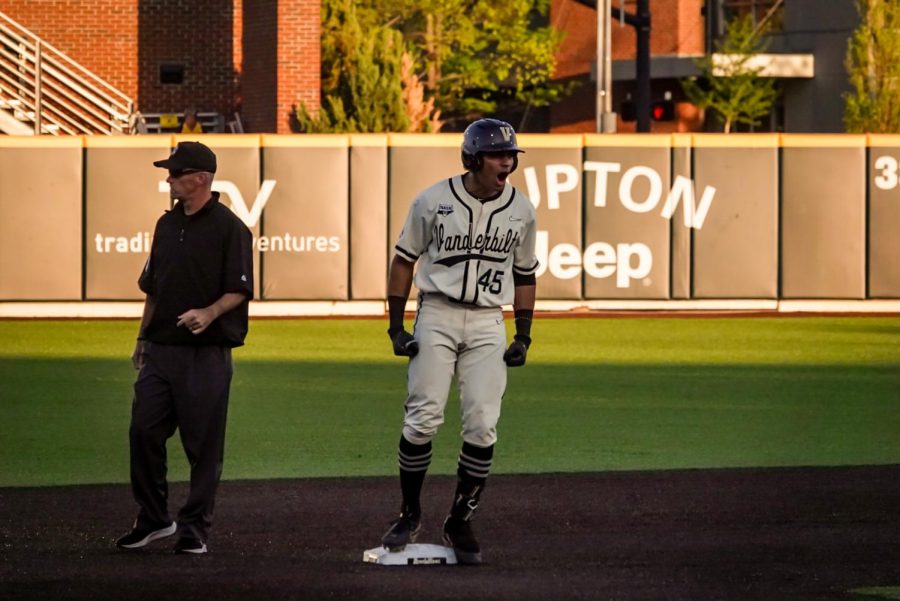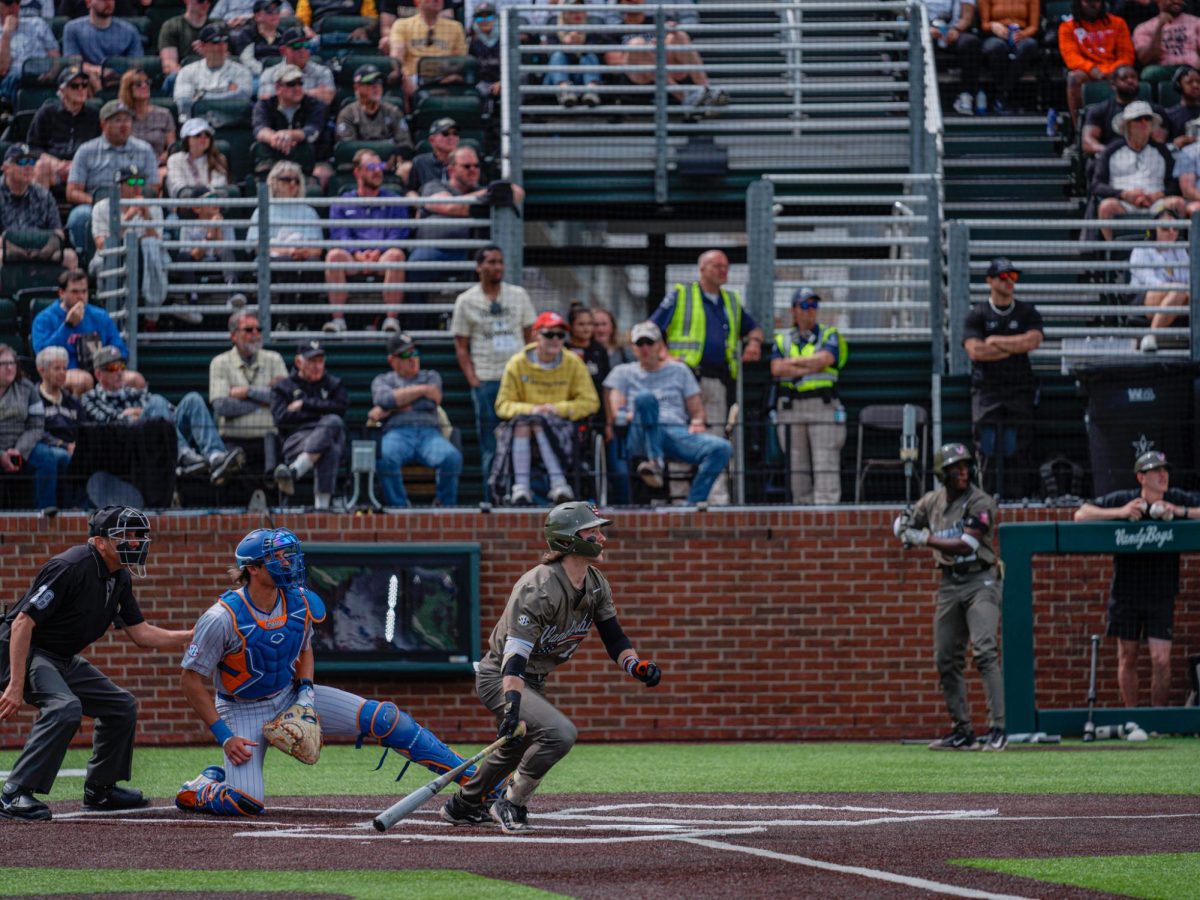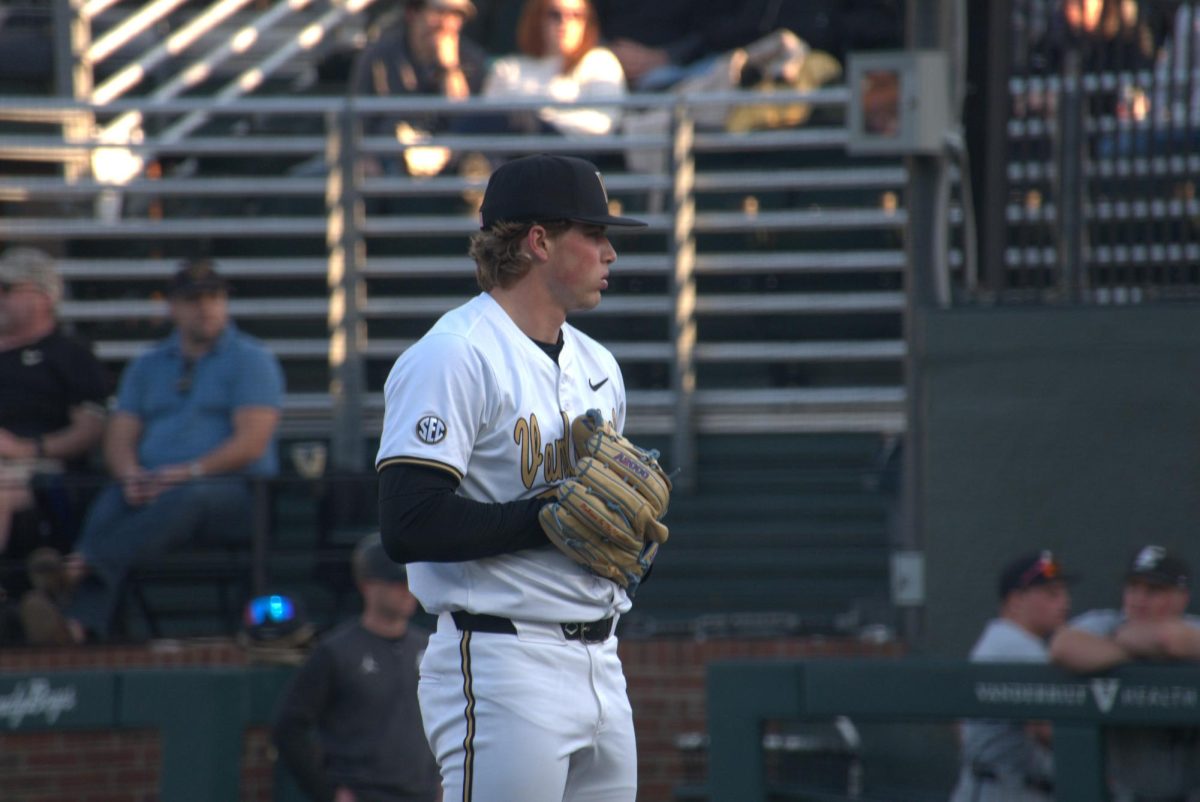Following its worst performance in regular season conference play (13-17) since 2009, Vanderbilt made a surge in the SEC Tournament, reaching the semifinals despite being seeded eighth. Coming off of a series loss at Kentucky, there were serious questions of whether Vanderbilt could win away from home. The Commodores drowned out the noise to make a deep run in Hoover, Ala.
Vanderbilt matched up against Florida for a single-elimination game to open up the tournament. Starting pitcher Bryce Cunningham threw six shutout innings, allowing only five hits and no walks. The performance should restore confidence in his ability to deal on the road, as he had previously amassed an ERA of 11.50 in away games. Freshman Brennan Seiber was credited with the save after holding off Florida for the final three innings to secure a 6-3 victory.
The Commodore offense came to life in the second round against No. 1 Tennessee, propelling Vanderbilt to a 13-4 win over the rival Volunteers. Of the team’s 15 hits on the night, four of them were home runs. Alan Espinal tanked two over the fence to drive in five runs. Shortstop Jonathan Vastine hit a home run of his own to bring his season total to 10, second only to Espinal on the team, who has 12. Freshman Colin Barczi capped off the night with his first collegiate home run.
Round three against Mississippi State was scheduled for 8 p.m. CDT, but the first pitch was thrown nearly an hour and a half later by Vanderbilt’s JD Thompson. Thompson delivered his third quality start of the season, pitching six innings and only letting up one run on five hits. The two teams battled well into the night, but thanks to some midnight magic from reliever Ryan Ginther, who got Vanderbilt out of a bases-loaded jam in the seventh, the Commodores were able to hold onto a 4-3 win. The victory made head coach Tim Corbin the winningest coach in SEC Tournament history with 47 wins.
Thanks to the unique, double elimination structure of the SEC Tournament, Vanderbilt was once more pitted against Tennessee in the semifinals. The same structure that had benefited Vanderbilt last year came back to bite it, as the Commodores were eliminated by the Volunteers in the rematch. Due to injuries and the harsh realities of postseason play, Vanderbilt’s pitching staff was stretched thin going into the matchup. Left with few options, Corbin decided to start freshman Ethan McElvain, who had not played since injuring his back against Florida on April 20. McElvain was replaced by Seiber after pitching a single shutout inning. Seiber let up two runs in three innings of work and was replaced by yet another freshman, Luke Guth. Braden Holcomb tied the game with a two-run shot in the bottom of the fifth, but Tennessee would regain the lead the next frame and never look back, winning 6-4.
Three up.
Vanderbilt’s NCAA Tournament stock
Prior to the SEC Tournament, Vanderbilt’s postseason prospects were uncertain. Despite dropping the series against Kentucky, Vanderbilt was able to earn a 12-4 victory in the weekend’s final game to pick up its 13th conference win. In the past, 13 wins has been the benchmark to earn an invitation to the NCAA Tournament for SEC teams. However, a historically competitive year for the conference left four other SEC teams with the same win total. Factoring in those with winning records would send 11 of the conference’s teams to the NCAA Tournament — an unlikely scenario.
Having just been eliminated from the SEC Tournament, the Vandyboys will miss out on an automatic bid to the NCAA Regionals, but their performance should serve to provide the selection committee with some clarity on Vanderbilt’s standing as an at-large team. All three of Vanderbilt’s wins in Hoover came over tournament-worthy SEC teams. In the first round, the Commodores cruised past fellow 13-win Florida, who they previously beat in a regular season series. This first win proved Vanderbilt’s superiority over at least one of its comparable SEC foes, moving it further away from the bubble. Vanderbilt followed this up with two wins against ranked opponents, No. 1 Tennessee and No. 15 Mississippi State — both of which are projected to be NCAA Regional hosts by D1 Baseball. Even with a close loss in a rematch against the No. 1 seed, Vanderbilt has proven that it can hang with the nation’s best in postseason play.
As of May 25, Vanderbilt was predicted to be a No. 2 seed in an NCAA Regional hosted by Indiana State, which D1 Baseball ranked as the No. 15 national seed. This placement seems fitting, as Vanderbilt currently sits at No. 19 in the RPI. Vanderbilt’s standing in the RPI and its postseason showings thus far should be enough to solidify itself as a tournament team.
Pitching staff prowess
Time and time again, poor pitching has let games on the road get away from the Commodores. Overall, Vanderbilt holds an ERA of 6.24 in SEC play, giving a glimpse into season-long struggles for the squad. The staff finally began to start showing dependability in Hoover, finishing the tournament with an ERA of 4.00 through its semifinal run. Through 17 innings of work, Vanderbilt’s starting pitchers only walked three batters and let up just 15 hits. Notably, Vanderbilt allowed 18 walks in its series against Kentucky the weekend prior, hitting another 12 batters.
The bullpen was also very dependable in Hoover. Seiber and Ginther should both be key players going into the NCAA Tournament. Both were named to the Midseason Watch List for the nation’s best reliever in April, and both picked up saves in the SEC Tournament. Miller Green, who currently leads the team in ERA with 2.61, was credited with the win against Tennessee after pitching four shutout innings, only giving up three hits to one of the most dynamic offenses in the nation. Green also struck out Christian Moore, who leads the SEC in hits with 93, in their only face-off.
Other relievers featured in the tournament — Greysen Carter, David Horn and Alex Kranzler — only let up one run between them. This suggests that if a similar occasion were to arise in the NCAA Tournament where Vanderbilt is short-staffed, the trio could perform. Another positive for Vanderbilt’s pitching staff is the return of McElvain, who could also serve to fill in some of the holes in Vanderbilt’s rotation.
Team morale
At points throughout the regular season, it seemed as though Vanderbilt would never find its footing. But the indomitable Commodore spirit shone through at the SEC Tournament. With their fate in their own hands, the Vandyboys pulled off three impressive wins before a tough loss to Tennessee. Scrambling at the brink of elimination, the Commodores rallied behind their pitching staff to beat expectations.
The energy was high in Hoover all tournament, and the Commodores have much to be proud of. First off, with an NCAA Tournament bid all but secured, Vanderbilt was able to accomplish one of its goals despite not walking away from Hoover with hardware. The Commodores also stomped rival Tennessee in the opponent’s first meeting. Even though they lost the rematch, they stayed competitive, which should only instill the Commodores with a sense of confidence that they can compete with anybody in the NCAA Tournament.
“The team as a whole went out there having fun, just feeding off of each other’s energy, “ Austin said following the victory over Florida.
That energy could be seen with every extra-base hit and home plate stomp throughout the tournament. When Vanderbilt needed an out, the dugout didn’t sit back with their fingers crossed, they hopped onto the railing to get involved.
Three down.
Patterns
Old habits die hard, so Vanderbilt may be in for a rough time in the NCAA Regional Round. Last year, the Commodores had an impressive run in the SEC Tournament after a disappointing end to the regular season. Sound familiar? While this year and last year may not be perfectly identical, the discrepancies bode even worse for Vanderbilt’s prospects this year. Last year, the team dropped two of its final three series before winning the SEC Tournament. This year, the team dropped four consecutive series before losing in the semi-finals of the SEC Tournament. The pattern to expose here is that Vanderbilt underachieves to finish the regular season before excelling in the conference tournament. Vanderbilt hosted its NCAA Regional last year but was still eliminated. It seems as though last year, Vanderbilt lost steam by the end of the season before making a last stand in the SEC Tournament, leaving it worn out for the NCAA Tournament.
In an interview with ESPN Network, Corbin emphasized what the SEC Tournament means to his team.
“The [SEC] Tournament means a lot to Vanderbilt, always has,” Corbin said.
Perhaps the SEC Tournament may mean too much to Vanderbilt, as it experienced an early exit shortly after in the NCAA Tournament last year. For a team with the caliber to compete for national titles, it may have to consider taking the SEC Tournament more lightly, as the conference tournament can wear players out.
Batting average
A blowout victory over Tennessee may have masked an otherwise lackluster week at the plate for Vanderbilt. This season, Vanderbilt is batting .286 — already an average figure compared to the rest of its conference competition. In the SEC Tournament, Vanderbilt batted .269. If you take out the stellar performance against Tennessee, Vanderbilt is itching the Mendoza Line with an average of .223. Outstanding pitching won two games for Vanderbilt, and an uncharacteristically explosive day for the offense won one. In the game against Florida, Vanderbilt was out-hit 9-6, but came away with a 6-3 win. Vanderbilt was again out-hit by Mississippi State 8-7 and Tennessee 10-8 in the second face off. If Vanderbilt is to go deep in the NCAA Tournament, its batters must step up to the occasion.
Devin Futrell
Despite the success of Vanderbilt’s pitching throughout the SEC Tournament, Devin Futrell was the only starter who seemed to struggle. Futrell got the nod in Vanderbilt’s first game against Tennessee, and while he got off to a strong start, he gave up a three-run home run in the fourth inning and was replaced before the start of the fifth. After beginning the season as the Sunday starter in Vanderbilt’s rotation, Futrell has struggled to find a consistent role after since his month-long absence from a shoulder injury he suffered on April 23 against UT Martin. With the rise of Thompson as an effective starter for Vanderbilt, it may be time to reassess Futrell’s status. In a regular season win over Tennessee, Futrell pitched three innings of relief for Thompson to preserve a 3-0 shutout. When Futrell was given a start against Tennessee in the tournament, he allowed four earned runs, three of which came in his fourth inning. It seems as though Futrell may not be ready for high-volume appearances just yet coming off of his injury. As was proposed in a previous edition of this column, it may be best for Futrell to assume a bullpen role for the foreseeable future.
Vanderbilt’s postseason fate will be decided on Monday, May 27 at 11 a.m. CDT, when the selection committee announces the field of 64 for the NCAA Tournament.













